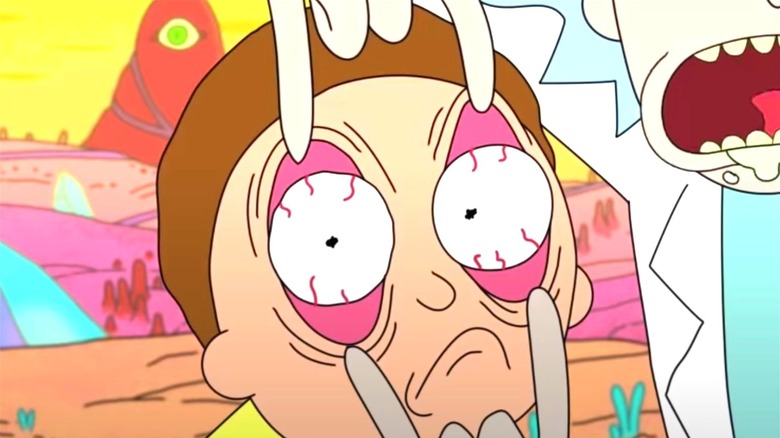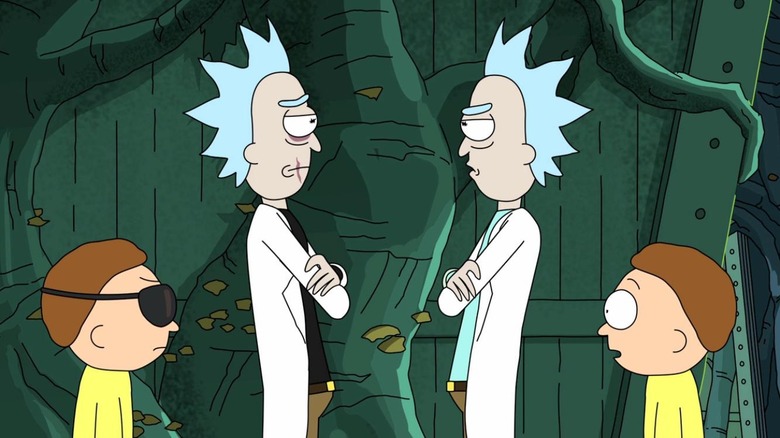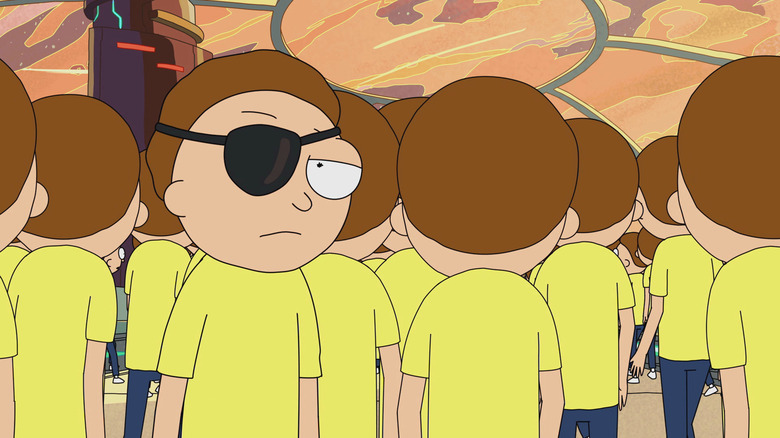Out Of Every Theory For Rick And Morty, This One Stands Above The Rest
Over its five-season run, "Rick and Morty" fans have cooked up almost as many theories about the show as there are Ricks in the multiverse. Not all of them hold up to scrutiny and many have been directly contradicted by episodes of the show, but some still swirl around the internet collecting new points of evidence.
Of these, many are fun to think about, but one more than any other has a direct impact on how viewers are bound to approach their interpretation of the show. If true, this is a theory that would forever change "Rick and Morty" in the eyes of its fans. More than any other show that relies on a multiverse as its central conceit, "Rick and Morty" has gone out of its way to let viewers know how little it cares about continuity. The show often mocks its viewers for thinking something that seemed important in one episode would matter in another, so hardly anybody ought to be surprised about this one.
Not every episode of Rick and Morty follows the same version of its characters
Starting with Season 1's acclaimed episode, "Rick Potion #9," the show hammers home that there are infinite versions of the Sanchez/Smith family when, to escape the destroyed "Cronenberg" timeline, Rick takes Morty to an alternate dimension in which the pair happened to die at that same moment. They drag their own bodies to a grave in the backyard and, in a later episode, Morty informs this universe's Summer what happened, saying, "Nobody exists on purpose. Nobody belongs anywhere. Everybody's going to die. Come watch TV."
Since that episode aired, "Rick and Morty" has leaned heavily into the ambiguity created by an infinite number of universes with copies of the same characters. While some dimensions have versions of the characters that are significant deviations from the norm, such as "eyepatch Morty" or "Evil Rick" from Season 1, Episode 10, the majority of them are essentially carbon copies of each other. Therefore, any set of Rick and Morty could be the focus of any episode which does not explicitly contradict that interpretation.
Several episodes, including the aforementioned "Close Rick-Counters of The Rick Kind," make pointed reference to "universe C-137," which appears to be the primary universe in which the show takes place. Season 5, Episode 2, "Mortyplicity," recently showed us that every original Rick in each universe has created an infinite number of clones to use as decoys, all of whom believe themselves to be the original. While these clones become recognizably malformed, those created by the original Rick are too close to their creator to tell the difference. It seems as if the show is trying to tell us something.
There is a primary universe for Rick and Morty, but not every episode takes place in it
Based on this preponderance of evidence, it is clear that the show could choose to tell a story about a Rick, Morty, Summer, and so forth from any universe without informing the audience. If that's the case, it would make sense for a show that so clearly delights in telling its audience to throw continuity out the window. For a while, now, the show has introduced what seem to be major plot points, only to mock the audience for caring about them. Consider "Eyepatch Morty" from Season 1, who fans spent years coming up with theories about, only to have him reappear in Season 4, Episode 6.
It should be stressed that this episode is a metacommentary on how "Rick and Morty" itself is a fictional construct, and "Eyepatch Morty" appears in a scene that is non-canonical within the show's universe, the ultimate reminder to fans who obsessed over the character that nothing the show does is meant to do anything more than tell a moment-to-moment story. While "Eyepatch Morty" has a small storyline in one other wonderful Season 3 episode, "The Ricklantis Mixup," it is notable that the episode is set at the Citadel of Ricks, the central point of the "Rick and Morty" multiverse.
Not only does the lack of continuity between episodes lend credence to the idea that many episodes take place with a different set of the same characters, it would also be a great get-out-of-jail-free card for TV writers who are swapped out season-to-season and create accidental plot holes in the show. It's right in keeping with the show's old mantra: Nobody exists on purpose. Nobody belongs anywhere. Everybody's going to die. Come watch TV.


